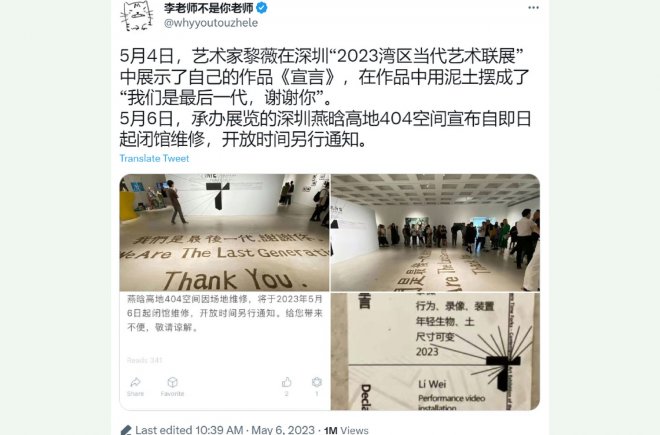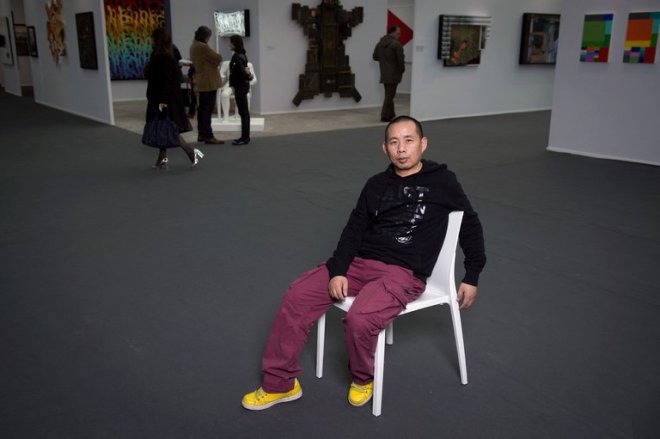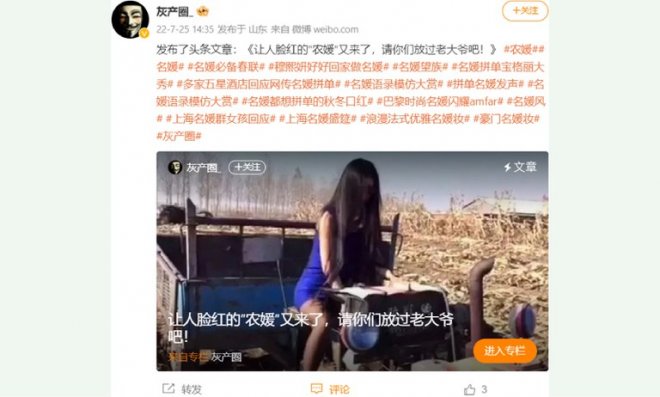
Authorities in the southern city of Shenzhen shut down an art exhibit that described young people in China as the "last generation," a reference to a viral video from the 2022 Shanghai lockdown, in which a young man tells police officers threatening him that he won"t be having kids.
Beijing artist Li Wei was served a "notice of closure" by the venue hosting his work "Manifesto," which consists of the words "We Are The Last Generation, Thank You." in English and Chinese, according to information posted to Twitter by "Mr. Li is not your Teacher."
The work had been part of a contemporary art exhibit in Shenzhen"s Nanshan district to mark the anniversary of the 1919 May Fourth Movement of patriotic young Chinese, according to the account, which typically posts reports that would be quickly censored within the Great Firewall of Chinese internet censorship.
“On May 6, the Shenzhen Yanhan Highland 404 Space, which hosted the exhibition, announced that it would be closed for maintenance," the tweet said, adding that the exhibit had been open for just four days.
The move comes as President Xi Jinping has been struggling to counter a growing culture of passive resistance among young people, who face dwindling job prospects, a failing economy and scant desire to marry or have children.
Local officials have announced schemes to relocate unemployed urban youth to rural areas to work in agriculture, potential signs of a planned mobilization that was last tried during the political turmoil of the Cultural Revolution (1966-1976).
Social justice theme
Li Wei’s work typically carries a strong social justice theme, said an arts administrator who gave only the surname Li who met him more than 10 years ago.
"He uses his works to speak out at social and artistic events," she said. "He used his installation ‘A Cake’ to speak out in 2010, when the Beijing Art District was demolished” by the authorities.
 China"s artist Li Wei poses at the Grand Palais on the sidelines of the Paris Art Fair in 2014. Credit: AFP
China"s artist Li Wei poses at the Grand Palais on the sidelines of the Paris Art Fair in 2014. Credit: AFP
Censors backed by the Communist Party have been deleting references to a viral video that spawned the "last generation" meme, which emerged as a form of protest over ongoing lockdowns, mass incarcerations and compulsory testing under the three-year zero-COVID policy, which ended in December.
In the viral video, PPE-clad police officials turn up outside a young man"s apartment and try to force them to go to an isolation camp even though he had recently tested negative for coronavirus.
"We"re negative. You have no right to take us away," the man says, before a police officer steps forward wagging a finger and says: "You know that we will punish you, right? And when that happens, it will have a bad effect on your family for three generations."
"We"re the last generation. Thank you." the man replies in the video which began circulating on Chinese social media platforms in May 2022, garnering huge numbers of views and comments.
Some joked online that the era from 1966 onwards was all about the innocence of revolution and justified rebellion, while the 1989 pro-democracy movement felt it was their "duty" to protest.
‘Saying no to four things’
According to online comments, the youth of today are shutting up shop before their lives have properly begun, by referring to themselves as the "last generation," or "the People Who Say No to Four Things": finding a mate, marriage, mortgage and raising kids.
Former Nanjing teacher Gu Fang said local businesses are closing down in large numbers, while foreign investors are fleeing, leaving few opportunities for fresh graduates as unemployment runs at 20% for that age group.
"Their outlook is grim in terms of basic material security," Gu said. "Yet the phrase "we are the last generation" also shows psychological distress."
"[Li Wei"s] artwork expresses dissatisfaction and anger, wondering whether modern life is even worth living," he said.
To try to counter that pessimism, Xi praised young people who had "gone down to the villages and fields" as part of the "rural revitalization" campaign in a letter to students of the China Agricultural University to mark May Fourth.
Similar phrasing was used by late supreme leader Mao Zedong to initiate the mass mobilization of educated urban youth to the countryside during the Cultural Revolution.
"Chinese youth in the new era should embrace this spirit," Xi wrote, in a reply to an earlier letter from the students saying they would be "seeking out hardship" by volunteering for rural manual labor.
His comments came after he gave a speech on "rural revitalization" on Dec. 24, 2022, calling for "orderly guidance" of college graduates, skilled businesspeople, migrant workers and enterprises to "return to their hometowns," with young people being "the most dynamic force" behind his plan, according to state media.
‘Familiar ring’
Wu Chien-chung, associate professor at the National Taiwan Ocean University, said the wording of Xi"s letter had a "familiar ring."
"They have used this method of having young people write letters to Xi before," he said. "The Chinese Communist Party"s propaganda system is constantly adapting."
"They have recruited a group of young people to act as props to glamorize the Communist Party and act like a united front," he said, adding that Chinese agents in Taiwan had used a similar tactic by getting young Taiwanese people to write to Xi last year.
He said Xi"s letter comes after Vice President Wang Qishan warned people to "expect hardship."
"The whole of China and the entire world know that China"s economic growth has fallen sharply," Wu said, adding that authorities in the southern province of Guangdong have already launched a scheme to send 300,000 urban youth to rural areas.
 ”Here we go again with those so-called rural volunteers fit to make you blush," Weibo user Gray_Production_Circle wrote in July 2022 above a video clip of a glamorous young woman posing on a tractor [shown]. Credit: RFA screenshot from Weibo
”Here we go again with those so-called rural volunteers fit to make you blush," Weibo user Gray_Production_Circle wrote in July 2022 above a video clip of a glamorous young woman posing on a tractor [shown]. Credit: RFA screenshot from Weibo
"A lot of people thought it was a scam," Wu said. "Even mainland Chinese websites and Little Pinks [government supporters] thought it was cognitive warfare or fake news."
"Only when the government confirmed that it was a nationwide policy direction did they realize it was an overt conspiracy by the Communist Party … to try to solve youth unemployment and other issues," he said.
PR campaign
Public perception of the scheme hasn"t been helped by the appearance of scantily clad social media influencers posing as rural laborers on Chinese social media in recent months, Wu added.
”Here we go again with those so-called rural volunteers fit to make you blush," Weibo user Gray_Production_Circle wrote in July 2022 above a video clip of a glamorous young woman posing on a tractor. "Leave the poor old guy alone!"
A story on the Yiping News Network showed a group of scantily clad young women sitting at a farmyard table, describing the "rural volunteer" phenomenon as a new trend for Chinese social media influencers.
"Many rural villages have become places for Internet celebrities and beautiful women to check in and "show off their skills,"’ the story said.
Translated by Luisetta Mudie. Edited by Malcolm Foster.